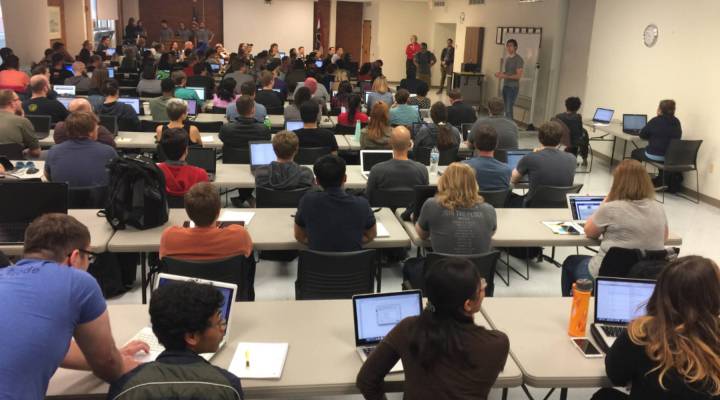
How to close the tech-job gap for minorities and low-income earners
How to close the tech-job gap for minorities and low-income earners

Five years ago, Marketplace explored how machines, robots and software algorithms were increasingly entering the workforce in our series “Robots Ate My Job.” Now, we’re looking at what humans can do about it with a new journey to find robot-proof jobs.
Last year, White House economists predicted that low-income workers — those who make less than $20 an hour — face the highest probability of losing their jobs to robots. But people of color are especially at risk: an Equal Employment Opportunity Commission released a report last year finding that just about 8 percent of tech-sector jobs are held by Hispanics and 7.4 percent by African-Americans.
But there are some organizations out there trying to close the gap and make sure low-income workers and people of color aren’t displaced by robots and automation.
In St. Louis, about 30 people are sitting in a coding training class run by the nonprofit LaunchCode. It operates in six locations nationwide helping people find careers in technology through education and matching them with companies that need tech talent.
“Digital literacy is becoming more of an imperative in today’s society,” said Haley Shoaf, education director for operations at LaunchCode. She said certain people aren’t getting access to the training to get tech jobs.
“When you look at the kind of people who face those barriers, I would say a disproportionate number of them are women, people of color, people from low-income backgrounds that just don’t have access to these opportunities,” Shoaf said.
| Which jobs will and won’t survive a robot takeover? |
| Women, venture capital and bias |
| Can Pittsburgh keep its workers from being replaced by smart machines? |
Seventy percent of LaunchCode’s students are making less than $30,000 a year, and many come from blue-collar manufacturing jobs or service industries such as hospitality. About half of the students in one program are people of color. But there have been some huge success stories.
In March 2015, President Obama mentioned LaunchCode alum LaShana Lewis in a speech. She’s an African-American woman who majored in computer science but didn’t finish and couldn’t get a job without a college degree. She worked entry-level jobs and continued honing her computer skills. Now she’s a systems engineer at MasterCard.
“What happened to me ushered in, like, a new reality with this world,” Lewis said.
Lewis remembers often being the only women and the only black person in her computer classes. Her job — fixing computers — is likely safe from robots, and she thinks despite technology, there’ll be a need for humans.
“Computers are here to service what humans need and what humans need changes,” Lewis said. “So you’re going to have to have a human somewhere.”
Economics professor Daron Acemoglu at the Massachusetts Institute of Technology co-authored a study that finds robots will win the battle with humans over jobs. He said robot and increased automation will cause employment losses and negative effects on wages, particularly for low-income earners and people of color.
However, “I think every group in U.S. society is ill prepared for it,” he said. “We have definitely been asleep at the wheel when it comes to our education system.”
Acemoglu stresses that technology is a good thing for increasing productivity and the quality of our lives, but some people are going to need help coping with it, and they can be better employed with help from the right institutions.
Check out the most and least automatable jobs in America.
There’s a lot happening in the world. Through it all, Marketplace is here for you.
You rely on Marketplace to break down the world’s events and tell you how it affects you in a fact-based, approachable way. We rely on your financial support to keep making that possible.
Your donation today powers the independent journalism that you rely on. For just $5/month, you can help sustain Marketplace so we can keep reporting on the things that matter to you.












